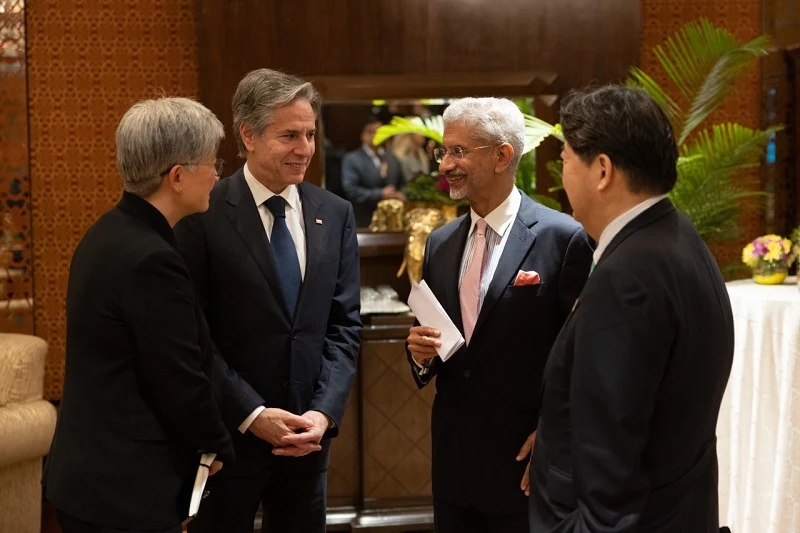The four-nation Quad grouping of India, the United States, Japan and Australia on Friday announced the establishment of the Quad Working Group on Counter-Terrorism which will explore cooperation amongst the Quad, and with Indo-Pacific partners, to counter new and emerging forms of terrorism, radicalization to violence and violent extremism.
A meeting of the Quad Foreign Ministers in New Delhi on Thursday morning noted with “deep concern” that terrorism has become increasingly diffuse, aided by terrorists’ adaptation to, and the use of emerging and evolving technologies.
It was presided by External Affairs Minister S Jaishankar and attended in-person by the US Secretary of State Antony Blinken, Japanese Foreign Minister Yoshimasa Hayashi and Australian Foreign Minister Penny Wong.
#WATCH | EAM Dr S Jaishankar, US Secretary of State Antony Blinken, Japanese Foreign Minister Yoshimasa Hayashi, Australian Foreign Minister Penny Wong today attended the Quad Foreign Ministers Meet, in Delhi pic.twitter.com/UcSbTIQNMA
— ANI (@ANI) March 3, 2023
The grouping – which Blinken later described as not a military one – will work together more comprehensively to tackle the threat of the Unmanned Aerial Systems (UAS) and the internet, including social media platforms for recruitment and incitement to commit terrorist acts, as well as for the financing, planning, and preparation of terrorist activities.
“We unequivocally condemn terrorism and violent extremism in all its forms and manifestations. We denounce the use of terrorist proxies and emphasize the importance of denying any logistical, financial or military support to terrorist organizations which could be used to launch or plan terrorist attacks, including transnational and cross-border attacks,” stated the Joint Statement released after the meeting.
“We reiterate our condemnation of terrorist attacks, including 26/11 Mumbai, which claimed lives of citizens from all Quad countries, and Pathankot attacks. We are committed to working together with our regional and international partners to promote accountability for the perpetrators of such terrorist attacks, including through designations by the UN Security Council 1267 Sanctions Committee,” it added.
Announcing that the first meeting of the Quad Working Group on Counter-Terrorism will be held in the United States in 2023, the Foreign Ministers also expressed their concern at attempts to politicise the working of the UNSC Sanctions Regimes and called on all states to maintain the transparent, objective and evidence based working methods of UNSC Sanctions Committees.
Reaffirming the Quad’s steadfast commitment to supporting a free and open Indo-Pacific “which is inclusive and resilient”, the Foreign Ministers reiterated that the Quad, acting as a force for regional and global good, will be guided by the priorities of the Indo-Pacific region through its positive and constructive agenda.
“Through the Quad, we seek to support the region through practical cooperation on contemporary challenges such as health security, climate change and the clean energy transition, critical and emerging technologies, infrastructure and connectivity, addressing the debt crisis through sustainable, transparent and fair lending and financing practices, space cooperation, cyber-security, humanitarian assistance and disaster relief (HADR), maritime security and counter-terrorism,” the Joint Statement mentioned.
#Quad Foreign Ministers attend the #RaisinaDialogue2023 in Delhi- WATCH.
‘The QUAD is working in 2023 because we have a leadership less burdened by the baggage’, says EAM S Jaishankar
Tune in: https://t.co/01G4Ar9gvW pic.twitter.com/1eZcEPU1E9
— TIMES NOW (@TimesNow) March 3, 2023
Noting that Washington will also be hosting the Quad Maritime Security Working Group meeting in March 2023, the Quad ministers stated that they recognise that peace and security in the maritime domain underpins the development and prosperity of the Indo-Pacific.
They also expressed “serious concern” at the militarization of disputed features, the dangerous use of coast guard vessels and maritime militia, and efforts to disrupt other countries’ offshore resource exploitation activities.
“We reiterate the importance of adherence to international law, as reflected in the UN Convention on the Law of the Sea (UNCLOS), to meet challenges to the maritime rules-based order, including in the South and East China Seas. We strongly oppose any unilateral actions that seek to change the status quo or increase tensions in the area.”
.@hayashi09615064: #Quad is not a #Beatles band, playing together for 10 years. It’s a soft group or a band where each member has its own autonomy. But four of us are bound by trust and shared values. #Raisina2023 pic.twitter.com/HvbaomU114
— Raisina Dialogue (@raisinadialogue) March 3, 2023
With the next Quad Leaders’ Summit being hosted by Australia this year, the Foreign Ministers vowed to work closely to align and complement Quad’s agenda with Japan’s Presidency of the G7, India’s Presidency of the G20 and the United States’ APEC host year in 2023.
“We will continue to meet regularly to deliver concrete benefits and serve as a force for good, deepening practical and positive cooperation for the benefit of the Indo-Pacific region,” concluded the Joint Statement.




















